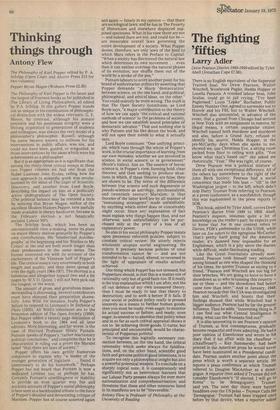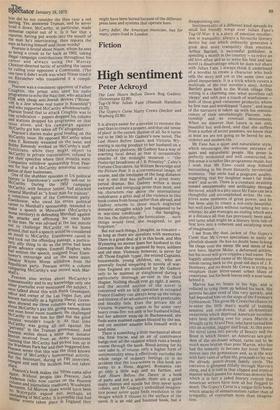The fighting 'fifties
Larry Adler
Drew Pearson Diaries 1949-1959 edited by Tyler Abell (Jonathan Cape £7.50)
There is no English equivalent of the Superstar Trained Seal. No Drew Pearson, Walter Winchell, Westbrook Pegler, Hedda Hopper or Louella Parsons. A crooked labour boss, John Scalise, could go to jail crying, "I've been Peglerised." Louis "Lepke" Buchalter, Public Enemy Number One, agreed to surrender not to Hoover and his FBI, but to Walter Winchell. Winchell also announced, in advance of the event, that a gunsel from Chicago had arrived in New York with an assignment to remove, by illegal means, a certain unpopular citizen. Winchell named both murderer and murderee and also, before a Grand Jury, refused to identify his source. Hedda Hopper, in the pre-McCarthy days when she spoke to me, showed me, one Christmas Eve, a sitting room packed from floor to ceiling with gifts. "You know what that's based on?" she asked me rhetorically. "Fear." She was right, of course.
Drew Pearson was a political mixture of them all with one exceptional difference. All of the others lay somewhere to the right of the John Birch Society. Pearson had a social conscience that made him lean — "tilt" in the Washington jargon — to the left, which didn't stop Harry Truman from referring to Pearson, at a press conference, as a sonofabitch, though this was euphemised in the press reports to SOB. '
This book, edited by Tyler Abell, covers Drew Pearson's diaries from 1949 to 1959. Abell, Pearson's stepson, assumes quite a lot of knowledge on the reader's part; he expects you to know that Joe in one context refers to Davies, FDR's ambassador to the USSR, while later on Joe refers to the egregious McCarthy. 'that's pretty hard going for the American reader; it's damned near impossible for an Englishman, ,which is a pity since the diaries, while difficult, make fascinating reading.
Like the Great Journalists already mentioned, Pearson took himself very seriously, seeing himself as one who shaped the thinking of his times. He quotes Truman as saying to a friend, "Pearson and Winchell are too big for their breeches. We are going to have to have a showdown as to who is.running this country — me or them — and the showdown had better come now than later." And in January, 1949, Pearson records that the CIA was investigating him and Winchell, and boasts that their findings showed that while Winchell had a bigger audience, Pearson had by far the greater influence. Then he adds, "Interesting thing is, if I can find out what Central Intelligence is doing, what can the Russians find out?"
It is also interesting to see Pearson's opinion of Truman, at first contemptuous, gradually become respectful and even admiring. He had a poor opinion of Eisenhower and wrote in his diary that if his affair with his chauffeur — (chauffeuse?) — Kay Summersby, hatl been printed in the American press he would never have been nominated as a Presidential candidate. Pearson makes another point about the press which is worth a separate article. He reports a press conference at which Truman referred to Douglas MacArthur as a demagogue. A reporter then asked if Truman did not consider Eisenhower's "If elected, I will go to Korea" to be demagoguery. Truman said yes. The next day there were banner headlines over the US press — Truman Calls Pee 'Demagogue.' Truman had been trapped once before by that device, when a reporter asked
him did he not consider the Hiss case a red herring. Yes, answered Truman, and he never lived it down. McCarthy, in particular, made immense capital out of it. Is it fair that a reporter, having put words into the mouth of the man he's interviewing, then reports the man as having himself said those words? Pearson is brutal about Nixon, whom he sees as being a crook as far back as 1952, taking illegal campaign contributions throughout his career and always using the Murray Chotiner-directed tactic of avoiding the issues by calling your opponent a Communist. (The one time it didn't work was when Nixon tried it Oil Khruschev who considered it a compliment).
Pearson was a consistent opponent of Father Coughlin, the priest who used his radio programme to echo the Nazi line, who attacked FDR with cheap anti-Jewish devices ("Roosevelt is a Jew whose real name is Rosenfeld") and who supported McCarthy wholeheartedly. Pearson found that to attack Coughlin was to lose syndication — papers dropped his column and stations dropped his programme on that issue alone, and his campaign against McCarthy got him taken off TV altogether. Pearson's diaries make good reading on the
McCarthy issue. He opposed McCarthy when John F. Kennedy weaseled on the issue, and Bobby Kennedy worked on McCarthy's staff. Politicians, while they might object to McCarthy in private conversation, refused to Put their speeches where their mouths were. Companies withdrew sponsorship from Pearson for fear of a McCarthy senatorial investigation of their businesses.
One of the shabbier episodes in US political
history is Eisenhower's cowardly sell-out to McCarthy. During the 1952 campaign McCarthy, with Senator Jenner, had attacked General Marshall as "a front man for traitors", a conscious agent of the Communist party. Eisenhower, who owed his entire political career to Marshall's sponsorship, intended to make a speech in Milwaukee (McCarthy's home territory) in defending Marshall against the attacks and affirming his own faith in the man. He was advised at the last minute not to challenge McCarthy on his home ground, that such a speech would be considered an insult to McCarthy. Eisenhower caved in and took out the offending passage, a particularly silly thing to do as the press had been given advance copies. Emmett Hughes, who had written the speech, resigned from Eisen
_Senator Wayne Morse withdrew from the _Republican party. Pearson wrote a column
sucbmParing McCarthy's war record with Marhall's. , Pearson also writes about McCarthy's homosexuality and to my knowledge only one other journalist ever mentioned the subject. I once talked about this with Hank Greenspun, editor and owner of the Las Vegas Sun, and known nationally as a fighting liberal. Green
Showed me three columns he'd written
about McCarthy's gay life, giving names, dates and even hotel room numbers. He challenged 1,":1cCarthy to sue him for libel but the good i,enator wouldn't touch it. At that time l,vicCarthy was going all out against the r,`Perverts" in the Truman government. And Eearson writes about a letter that Senator esJ_enton received from an Army lieutenant
aiming that McCarthy had picked him up in
thee Wardman Park bar and then buggered him. 1".n arson wrote that this was the third known Bute of McCarthy's homosexual activity. re ur the lieutenant, during an FBI interview,
place. eged and said the incident had not taken . .
Pearson's book makes the 'fifties come alive ',Again. Without people like Pearson, Jack 7.derson (who now carries on the Pearson e„ lurrin and journalistic tradition), Woodward, Icseornstein, Ed Murrow there would have been
Watergate exposé nor, Perhaps, an s _uPtrlinasking of McCarthy. It is possible that had l liar events taken place in England they might have been buried because of the different press laws and systems that operate here.
Larry Adler, the American musician, has for many years lived in London



































 Previous page
Previous page